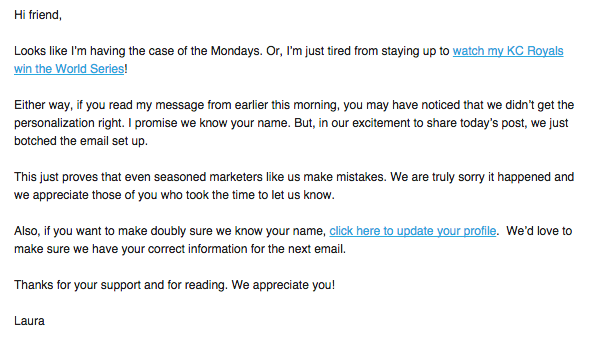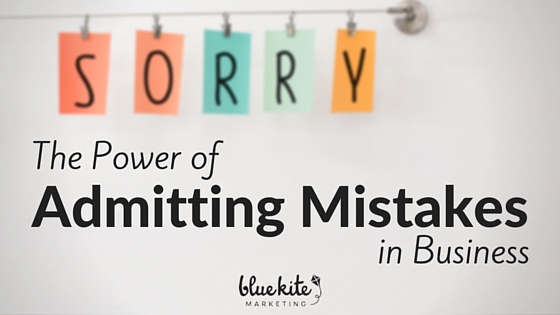There are few things worse than discovering that you or someone at your company has made a cringe-worthy mistake.
It’s embarrassing, frustrating and it can totally disrupt your business.
And if you’re like most people, it makes you want to crawl in a hole to hide from the potential fallout. Perhaps if you ignore the issue it will go away, right?
WRONG.
Ignoring the issue is perhaps one of the worst things you can do. But, that’s exactly what most companies do.
They believe that admitting mistakes shows weakness or that it can damage their reputation.
But, actually, the opposite is true. Admitting mistakes can show powerful, courageous leadership. And, it can even boost faith in your organization.
Don’t believe me?
Let me explain and give you an example.
Apologizing for My Email Blunder
Last week, we made a mistake at Blue Kite Marketing. In the email we send out to our blog subscribers to share our latest posts, we had forgotten to insert the mail merge tag that pulls in the person’s first name.
So instead of saying “Hey Steve,” in the first line of my email, it said this:

Ugh.
Certainly, this kind of thing happens all the time. I can’t count how often I get emails – especially unsolicited ones — that don’t include my name or the correct business name.
Heck, in this post, I even criticized a woman who botched her email merge.
Even though this mistake is fairly common, I felt terrible about it. Especially since I’ve preached about how to avoid this very problem.
That’s why I felt strongly that I needed to acknowledge the mistake.
Once we discovered the issue, I quickly wrote a second email that we sent to our audience. If you’re curious, here’s what it said:

You know what’s interesting?
I received MORE email responses from that message than anything else I’ve sent out.
I heard from subscribers who have never contacted me before. I heard from friends and colleagues who I haven’t talked to in awhile. I even heard from one woman who inquired about our consulting services.
And every email was a positive response complimenting us for how we handled the situation.
It was awesome to see how taking a few minutes to acknowledge the screw up really made a difference to our audience. It was a small step that had a big pay off.
It almost makes me want to make more mistakes just so I can create more dialogue with our great readers! Just kidding! 😉
Why You Should Admit Mistakes
Even though my email blunder was a relatively small mistake, it still shows the power of admitting when you messed up.
If you need more reasons to do this, here is why admitting mistakes is so important in business today:
- It demonstrates integrity. Apologizing for an error shows that you recognize you screwed up. If you don’t do that, most people will assume you didn’t realize you made a mistake or it shows you simply don’t care. It takes courage and character to admit when you’re wrong.
- You show that you’re human. I think one of the reasons people connected with my email is that it showed there was a real, live human being on the other side. Admitting mistakes can make you more relatable and show that you’re just like your audience or customers.
- It builds trust and loyalty. Believe it or not, admitting mistakes can actually help with customer retention and loyalty. One study showed that customers are twice as likely to forgive a company that apologizes over one that offers monetary compensation for the error. Other studies show that malpractice suits decline when the doctor apologizes for the issue. All of this proves there is huge power in saying “I’m sorry.”
- You stand out. So many companies try to sweep mistakes under the rug. Just look at VW’s issues right now. By apologizing and doing the right thing, you’ll stand out from all of the other companies who want to hide mistakes, shift blame or ignore problems.
How to Apologize with Grace
So now that you recognize the importance of admitting mistakes, how should you do it?
Whether you made a public blunder or a mistake with one of your clients, here are a few tips for how to apologize well:
- Act quickly. Don’t let the issue fester. The longer you let it go, the worse the situation will become.
- Take responsibility. As a business owner, the buck stops with me. Even if I wasn’t the one who made a mistake, I take ownership of the issue because it’s my company. Make sure you do the same in your business. Take responsibility for the actions of your company and don’t shift the blame to someone else. Not only with the recipient appreciate that, but your employees will too because they will see that you’ve got their backs.
- Be sincere. People can sniff an insincere apology from a mile away, so make sure you offer a heartfelt response. Actually mean what you say.
- Fix the problem. When apologizing, make sure you state how you’ll fix the error and what you’ll do to avoid it in the future. And more importantly, make sure you follow through. It also helps to put processes or safeguards in place to ensure you don’t make the same mistake again.
Although I hope you don’t make mistakes in your business, the reality is that we’re all human and it’s bound to happen. That’s why it’s important to understand how and why to admit when you’re wrong.
I promise that your audience — clients, employees and stakeholders — will love you for it.
If you want to be the first to be notified when we publish awesome articles like this one, sign up here. You’ll also get insider tips and direct access to me. And I even promise we won’t screw up your name! I just know you’ll love it. Get it here.




2 replies on “The Power of Admitting Mistakes in Business”
Excellent advice and all good tips. It’s funny the flurry of replies you received– it’s a potent reminder to all of us who write that the audience *is* out there week after week, whether they feel moved to speak up, or simply nod silently in agreement.
I guess we’ll have to categorize out-and-out mistakes (a glitchy mail-merge malfunction) differently than corporate gaffes, but it’ll be curious to follow the latest tempests in a teacup: the unwelcome attention Starbucks has received over this year’s minimalist Christmas Cup redesign, and the equally unwelcome attention major league sports teams are drawing over “paid patriotism” sponsorships. In both cases, I’d wager the brands are simply too popular, and their core fans too loyal, not to weather both “crises” with ease.
Great points. There are definitely people behind those email addresses, but I think folks tend to forget that! And you’re right – in the scheme of things, this is small potatoes than some of the bigger gaffes some large companies make. But, I think the concept still applies. It never hurts to apologize when you crew up!